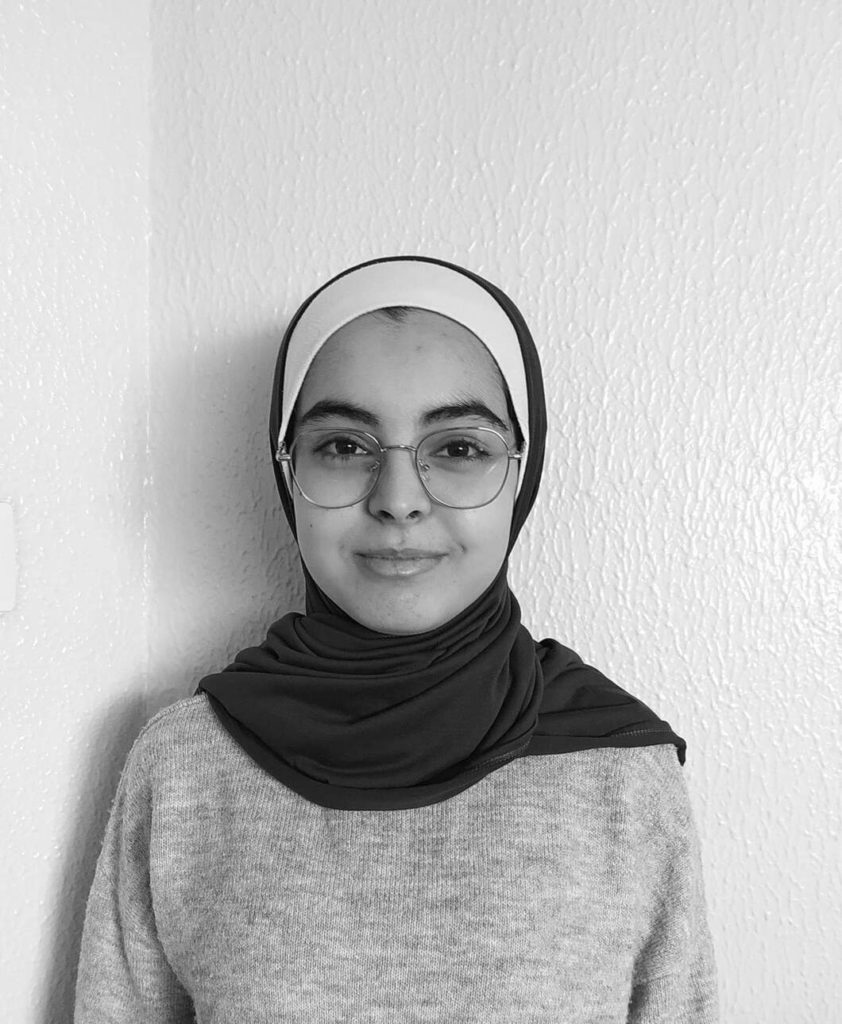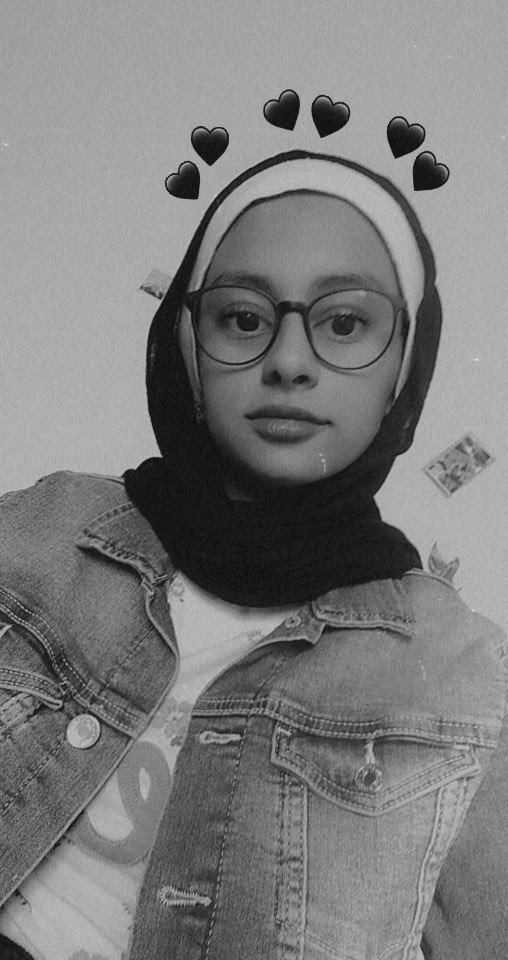
WINNER: Batool Abu Akleen, Palestine
Poem Title: I Did Not Steal The Cloud
Selected Artwork: Inji Efflatoun, Dreams of the Detainee, 1961
Batool said she was inspired by the artwork because she also writes behind the bars of another prison: Gaza. Judge Golan Haji said of the poem: “Writing gives the oppressed the honor of facing themselves. Israel is a pioneer in humiliation, exerting authority through weaponry, and manufacturing prisons. One of its prisoners, a young traveler with a free gaze, uses just a few words to awaken our own gazes, which have been hypnotized by images of disaster. She turns to Inji Efflatoun’s “Dreams of the Detainee” (1961), capturing the nightmares of a trapped Gaza, crowded with suffering, where jailers at the northern and southern borders mount checkpoints and brandish rifles and whips, waiting for escapees suspected of anything, even stealing a cloud. This is a possible impossibility. There is no metaphor in reality. Batool roams through the difficult life in the camp. Her senses are awake. We smell the foul stench of the kerosene lamp, taste the pickled peppers in falafel sandwiches, and we almost scratch our shoulders when she sketches a humble portrait of children wearing blue t-shirts, “their fabric like a flame that burns their wheat-colored bodies in summer.” Batool, using the eyes of her body and spirit, without exaggeration of wit or tears, draws the details of prisoners’ weakness and humiliation. The world narrows like a prison cell, and her poetry lights it up with pain and with mercy.”

RUNNER UP: Fayrouz Ahmed Allam, Egypt
Poem Title: My Small Town
Selected Artwork: Zeinab Abdel Hamid, Quartier Populaire, 1956
Of Allam’s poem, Haji said: “In her short poem, the poet melts down a painting that comes from another time and place and, from it, she generates a world where she wanders between colors and smells, etching what she sees in simple words and common idioms. She knows this place well. It is her hometown, which lives inside her, and it’s buzzing with the friendly hustle and bustle of small-town neighbors: roving carts, porters, street vendors, day laborers on the sidewalks. Fayrouz questions the silent residents of Zainab Abdel-Hamid’s painting “A Popular Neighborhood” (1956), where a yellow tram emerges from the fabric of silence into another age, where it enters the streets of Fayrouz’s imagination—a friend greeting the children. Ordinary greetings are precious, and “good morning” can be a key to explaining hearts and minds. Dreams are a power the poet uses to transform what she sees into what she wants, and what she wants here is the familiar. Here the magic and joy of her life are enough, surrounded by the grace of light, the scent of saffron, and the laughter of children playing football while being embraced by the sun. She sees life through childhood’s eyes, and this is what poetry strives for.”
More about the judge and winning poets:
Golan Haji is a Syrian-Kurdish poet, essayist and translator with a postgraduate degree in pathology. He lives in France. He has published four books of poems in Arabic: He Called Out Within The Darknesses (2004), Someone Sees You as a Monster (2008), Autumn, Here, is Magical and Vast (2013), and Scale of Injury (2016). His translations include (among others) books by Mark Strand, Robert Louis Stevenson and Alberto Manguel. He also published Until The War (2016), a book of prose based on interviews with Syrian women.
Batool Abu Akleen is a Palestinian high-school student born in Gaza, 2005. She says, “My passion for literature began when I was ten years old, and I write in many literary genres. I like short stories, diaries, and poetry, in particular. My journey with poetry began with my first literary evening in Al Qattan Foundation, Gaza Strip, where I felt that poetry is my soul, my home, and my sanctuary, and that I might become a great poet someday.”
Fayrouz Allam is a 14-year old Egyptian student at the Universal American School in Dubai, and she is passionate about Arabic poetry.
فئة القصيدة باللغة العربية (لليافعين 18-14)، والحكم الشاعر جولان حاجي

المرتبة الأولى: بتول أبو عقلين، فلسطين
عنوان القصيدة: لم أسرق الغيمة
العمل الفني المختار: إنجي أفلاطون، أحلام المعتقلة، ١٩٦١
قالت بتول أبو عقلين أنّ العمل الفني ألهمها، كونها تكتب أيضاً من خلف قضبان سجن آخر: غزة.
وقال الحكم جولان حاجي واصفاً القصيدة: “تمنح الكتابةُ المهانين شرفَ أن يواجهوا أنفسهم. إسرائيل رائدة في الإذلال والتأديب بالأسلحة وتصنيع الزنازين. إحدى سجيناتها مسافرة صغيرة طليقة النظرات، توقظ بمفرداتٍ قليلة عيونَنا التي تنوّمها صور الكوارث. إنها تعود من أمام “أحلام المعتَقَلة” (1961) لأنجي أفلاطون فتحطّ أمامها كوابيس غزة المحبوسة المزدحمة بالعذابات، حيث السجّانون، حرس الحدود شمالاً وجنوباً، يُعلون الحواجز ويُشهِرون البنادق والسياط، متربّصين بالفارّين المشتبهين حتى بسرقة الغيم. هذا أحد المستحيلات الممكنة. لا مجاز في الواقع. تجوب بتول حياة المخيّم الفادحة. حواسّها يقظة. نشمّ معها الرائحة الكريهة لمصباح الكاز، ونذوق الفلفل المخلل في سندويش الفلافل، ونكاد نحكّ أكتافنا حين ترسم لنا بتواضع كلماتها أطفالاً يرتدون قمصاناً زرقاء “قماشها كاللهب يشعل جسدهم الحنطي في الصيف”. بتول، بكل العيون في جسدها وروحها، بحياء فطنتها ودمعتها العزيزة، استلّت من أيام السجناء تفاصيل الضعف والهوان، فلم تزخرفها بالفصاحة ولا أثقلتها بحشو الكلام ولا أطنبت في الشكوى. العالم يضيق كالزنزانة، والشعر يضيئها بالألم والرحمة.”

المرتبة الثانية: فيروز أحمد علام، مصر
عنوان القصيدة: بلدتي الصغيرة
العمل الفني المختار: زينب عبد الحميد، منطقة شعبية، ١٩٥٦
وحول قصيدة فيروز علّام، قال حاجي:
“ذوّبت الشاعرة في قصيدتها الصغيرة لوحة آتية من زمان ومكان آخرين، ليولَد من هذا التلاقي عالم راحت تتسكّع فيه بين الألوان والروائح، مدوّنةً بأبسط الكلمات وأشيع التعابير نبضَ ما ترى. إنها تعرف هذا المكان جيداً. هذه هي بلدتها التي تسكن كلٌّ منهما الأخرى، موّارة بالصخب الأليف والزحام الآمن للبلدات الصغيرة- الجارات، العربات الجوالة، العتالون، باعة البسطات، العمال المياومون على الأرصفة. استنطقت فيروز الصامتين الساكنين، سكّان لوحة “حي شعبي” (1956) لزينب عبد الحميد، فخرج الترام الأصفر من صمت القماشة واجتاز الزمن ليدخل شوارع مخيلتها- صديقاً يسلّم على الأطفال. التحيات العادية ثمينة، “صباح الخير” مفتاح يشرح الوجه والقلب. الحلم قوةٌ تحوّل ما تراه الشاعرة إلى ما تريده، وما تريده هنا هو ما تأْلَفه. يكفيها سِحراً وفرحاً البقاءُ حية، محاطة بنعمة الضوء وعبق الزعفران وضحكات أطفال يلعبون الكرة وتعانقهم الشمس. إنها تشاهد الحياة بعيون الطفولة، وهذا هو ما يسعى إليه الشعر.”
المزيد عن الحكم والشاعرتين الفائزتين:
جولان حاجي شاعر وكاتب مقال ومترجم سوري كردي، مقيم في فرنسا. تخرج في كلية الطب، جامعة دمشق، وتخصّص في علم الأمراض. نشر العديد من المقالات والدراسات والترجمات الأدبية في صحف ومجلات عربية وأجنبية. من مؤلفاته: “ميزان الأذى”، “إلى أن قامت الحرب”، “الخريف، هنا، ساحر وكبير”، ” نادى في الظلمات”. ومن ترجماته: “هندباء برية” لياسوناري كاواباتا، “ذاكرة القراءة” لألبرتو مانغويل، “دفاتر سرية” لأنطون تشيخوف، “دكتور جيكل ومستر هايد” لروبرت لويس ستيفنسن.
بتول أبو عقلين طالبة في الثانوية، فلسطينية من مواليد غزة عام 2005. تقول بتول: “أبديت اهتمامي بالأدب مذ كان عمري 10 سنوات. أكتب أنواع متعددة من الأجناس الأدبية، كالقصة القصيرة، واليوميات وبشكل خاص الشعر. كانت بدايتي الحقيقية مع الشعر خلال أمسيتي الأدبية الأولى في مركز القطّان فرع غزة، فقد شعرتُ حينها أنّي أتنفس الشعر وأنه بيتي وملاذي الآمن، وربما أكون شاعرة عظيمة يوماً ما.”
فيروز علاّم طالبة مصرية في المدرسة الأمريكية العالمية في دبي، تبلغ من العمر 14 عاماً، ولديها شغف عارم بالشعر العربي.





